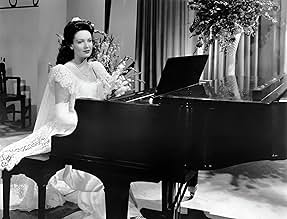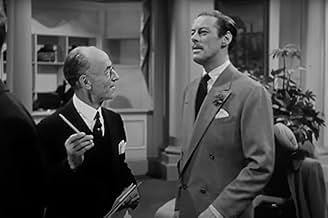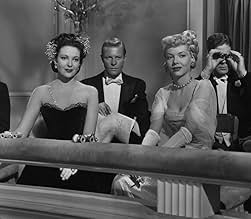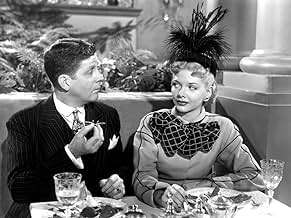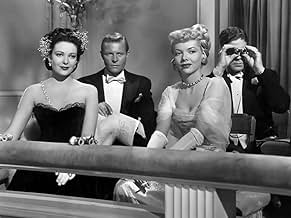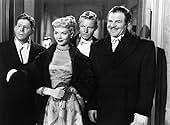IMDb RATING
7.4/10
6.1K
YOUR RATING
A man dreams of revenge when he suspects his wife is unfaithful.A man dreams of revenge when he suspects his wife is unfaithful.A man dreams of revenge when he suspects his wife is unfaithful.
- Awards
- 1 win total
Al Bridge
- House Detective
- (as Alan Bridge)
Abdullah Abbas
- Concert Attendee
- (uncredited)
Pati Behrs
- Minor Role
- (uncredited)
George Beranger
- Maître d'hôtel
- (uncredited)
Evelyn Beresford
- Madame Pompadour
- (uncredited)
Georgia Caine
- Dowager in Concert Box
- (uncredited)
James Carlisle
- Concert Attendee
- (uncredited)
Harry Carter
- Reporter
- (uncredited)
Bill Cartledge
- Page Boy
- (uncredited)
- Director
- Writer
- All cast & crew
- Production, box office & more at IMDbPro
Featured reviews
Unfaithfully Yours (1948)
I've never quite loved Preston Sturges as a director or Rex Harrison as an actor, so having the two of them together here didn't bode well, and I thought I'd announce my bias. And sure enough, on this second viewing I was reminded of a kind of crisp calculation that both of them have. Sturges makes amazing movies, no question, and the best of them (Palm Beach Story is my favorite) are hilarious classics. To see this one for what it offers you might first see a classic Sturges screwball from 1941 or 1942. But even those are clinical at heart (if they have a heart), so it's a little like sipping a very dry, clean martini and getting drunk. Alone. No olives. Wit and sophistication do better in the hands of Cole Porter, somehow, but see for yourself.
Harrison the actor overcomes his harsh demeanor in a movie like My Fair Lady because the music and the style there give him some kind of liberty, but here he is supposed to be sympathetic in his demented cruelty, and I only wish him failure. He is, to be sure, plotting the death of his wife. Three times. And then the fourth, beyond the symphony podium, with its madcap bedlam. It's funny in that zany way you have to laugh at. And you will laugh.
I love classical music and like the structure of the film, but as usual with Sturges, this structure makes the whole process detached and too too clever. Sturges himself wrote the screenplay for this idea way back in 1932, and if it had been shot then, before the Hays code, before the real rise of screwball, we would have had a very different movie. But what we have here is admirable and interesting, for sure, if not the zinger it could have been with a different tilt.
I've never quite loved Preston Sturges as a director or Rex Harrison as an actor, so having the two of them together here didn't bode well, and I thought I'd announce my bias. And sure enough, on this second viewing I was reminded of a kind of crisp calculation that both of them have. Sturges makes amazing movies, no question, and the best of them (Palm Beach Story is my favorite) are hilarious classics. To see this one for what it offers you might first see a classic Sturges screwball from 1941 or 1942. But even those are clinical at heart (if they have a heart), so it's a little like sipping a very dry, clean martini and getting drunk. Alone. No olives. Wit and sophistication do better in the hands of Cole Porter, somehow, but see for yourself.
Harrison the actor overcomes his harsh demeanor in a movie like My Fair Lady because the music and the style there give him some kind of liberty, but here he is supposed to be sympathetic in his demented cruelty, and I only wish him failure. He is, to be sure, plotting the death of his wife. Three times. And then the fourth, beyond the symphony podium, with its madcap bedlam. It's funny in that zany way you have to laugh at. And you will laugh.
I love classical music and like the structure of the film, but as usual with Sturges, this structure makes the whole process detached and too too clever. Sturges himself wrote the screenplay for this idea way back in 1932, and if it had been shot then, before the Hays code, before the real rise of screwball, we would have had a very different movie. But what we have here is admirable and interesting, for sure, if not the zinger it could have been with a different tilt.
Golden-Age Hollywood screwball fabricator Preston Sturges' last feature film worthy of his caliber, UNFAITHFULLY YOURS stars Rex Harrison as a renowned conductor Sir Alfred de Carter, on the eve of his concert, he is deviled by the paranoia that his much younger wife Daphne (Darnell) might have an extramarital affair with his personal secretary Anthony Windborn (Kreuger) thanks to his philistine brother-in-law August Henshler (Vallée)'s presumptuous misconstruction.
The apprehension and exasperation of being cuckolded hangs like a rock over Alfred's mind and Sturges only knows all too well, that for a man of Alfred's Brobdingnagian ego, the last thing to do is to lay bare his suspicion point blank in front of Daphne, from blunt rebuke to mounting curiosity, until firmly convinced by the circumstantial evidence, it all comes down to an increasingly fractious Alfred envisages three possible outcomes when wielding his baton in front of a full symphony orchestra and a full-house audience.
Every scenario is pertinently induced by a different classical piece from romantic-era he conducts and introduced by a cracking zooming-in shot right into Alfred's eyeball, the overture of Rossini's baroque SEMIRAMIDE triggers a murderous plan A which a framed Anthony to take the rap, yet what Wagner's operatic TANNHÄUSER suggests is a plan B with lenience and munificence, whereas plan C of a Russian roulette derring-do is influenced by Tchaikovsky's symphonic poem FRANCESCA DA RIMINI, a special treat for musos and cinephiles alike.
Sardonically, reality is, more often than not, not exactly what we have imagined, so during his execution of one of the plans after the concert (interestingly, the choice of the plan betrays Sturges' arch amalgamation of comedy and morbidness), a knockabout transpires in a slightly labored fashion which plays up to Alfred's clumsiness, and he is merely stuck in the preparatory step with the "so-simple-it-operates-itself" home recording unit when Daphne returns, thus an air-clearing finale is all we need to put everything back to the status quo.
A motormouthed Rex Harrison simulates a great impression as a conductor and relishes Sturges' long-winded screenplay which jollily throws barbs to the folly of machismo, meanwhile, Linda Darnell is hobbled as a virtuous beauty with a little more to act (albeit it is all in one's figment), yet, quintessentially it is Sturges' trademark witticism and sleight-of-hand that marks this oldie a treasure to be appreciated by posterity and here is the takeaway quip to round off my review - "If there is one reassuring thing about airplane, they always come down."
The apprehension and exasperation of being cuckolded hangs like a rock over Alfred's mind and Sturges only knows all too well, that for a man of Alfred's Brobdingnagian ego, the last thing to do is to lay bare his suspicion point blank in front of Daphne, from blunt rebuke to mounting curiosity, until firmly convinced by the circumstantial evidence, it all comes down to an increasingly fractious Alfred envisages three possible outcomes when wielding his baton in front of a full symphony orchestra and a full-house audience.
Every scenario is pertinently induced by a different classical piece from romantic-era he conducts and introduced by a cracking zooming-in shot right into Alfred's eyeball, the overture of Rossini's baroque SEMIRAMIDE triggers a murderous plan A which a framed Anthony to take the rap, yet what Wagner's operatic TANNHÄUSER suggests is a plan B with lenience and munificence, whereas plan C of a Russian roulette derring-do is influenced by Tchaikovsky's symphonic poem FRANCESCA DA RIMINI, a special treat for musos and cinephiles alike.
Sardonically, reality is, more often than not, not exactly what we have imagined, so during his execution of one of the plans after the concert (interestingly, the choice of the plan betrays Sturges' arch amalgamation of comedy and morbidness), a knockabout transpires in a slightly labored fashion which plays up to Alfred's clumsiness, and he is merely stuck in the preparatory step with the "so-simple-it-operates-itself" home recording unit when Daphne returns, thus an air-clearing finale is all we need to put everything back to the status quo.
A motormouthed Rex Harrison simulates a great impression as a conductor and relishes Sturges' long-winded screenplay which jollily throws barbs to the folly of machismo, meanwhile, Linda Darnell is hobbled as a virtuous beauty with a little more to act (albeit it is all in one's figment), yet, quintessentially it is Sturges' trademark witticism and sleight-of-hand that marks this oldie a treasure to be appreciated by posterity and here is the takeaway quip to round off my review - "If there is one reassuring thing about airplane, they always come down."
This film brings us Rex Harrison already foreshadowing Professor Higgins. He tries out the arrogant, picayune, verbally acute role and is absolutely successful. The seed is planted and we, who know what is to come twenty years hence, rub our hands gleefully in anticipation of Higgins. But Linda Darnell is no Eliza. Instead, she is a loving, docile, trusting wife, already dressed as though she will be meeting the Queen and looking beautiful and so very desirable.
The dialog crackles and moves fast. Only Rex Harrison and perhaps Cary Grant could have have delivered with the wit and brio that Sturges deserved.
There are two extended slapstick scenes that should have been cut shorter.
Edgar Kennedy as a Private Eye has a couple of great scenes when he turns out to be a classical music devotee and is knowledgeably enthusiastic about Harrison's conducting.
A digression: Harrison tosses a couple of tickets to the Philharmonic concert, they are orchestra tickets a few rows from the front row. Price $3.80, designated as "Patron"' seats.
The dialog crackles and moves fast. Only Rex Harrison and perhaps Cary Grant could have have delivered with the wit and brio that Sturges deserved.
There are two extended slapstick scenes that should have been cut shorter.
Edgar Kennedy as a Private Eye has a couple of great scenes when he turns out to be a classical music devotee and is knowledgeably enthusiastic about Harrison's conducting.
A digression: Harrison tosses a couple of tickets to the Philharmonic concert, they are orchestra tickets a few rows from the front row. Price $3.80, designated as "Patron"' seats.
One of Director Preston Sturges' most enjoyable films, Unfaithfully Yours is a dark comedy which uses the skills of it's leading actors Rex Harrison and Linda Darnell, to perfection.
Harrison plays Sir Alfred De Carter, a famous symphony conductor who has recently wed the beautiful and much younger Daphne (Darnell). Upon returning from a successful concert tour, Sir Alfred is confronted by his brother-in-law August(Rudy Valle), whom he had charged to look after Daphne while he(Sir Alfred)was away. Merely wanting August to drop in on Daphne on occasion, Sir Alfred is shocked to find out that August instead, enlisted a private detective to shadow his wife around town. Outraged when presented with the detective's file, Sir Alfred refuses to even look at it. However, he is eventually confronted with the sleuth's findings, which to his chagrin, reveals that while he was away, Daphne made a very suspicious late night call to a man's room wearing only a negligee. He is further devastated to find out that the rogue in question is his own right-hand man, Tony (Kurt Kreuger), a handsome, dapper fellow more closer in age to Daphne. Believing the worst, Sir Alfred's pristine world is suddenly turned upside down, and he becomes a man consumed with jealousy and suspicion.
From here we watch Sir Alfred's gradual meltdown as the thought of his wife's infidelity haunts his every moment. Even the concert stage can't provide him any solace. While performing before a sold out audience, his mind is less on the music and more on how he will deal with the adulterous duo. With his baton wailing wildly, his mind plays out various fantasies; his first thoughts are of murder, concocting an elaborate scheme which will leave Daphne dead and Tony framed as the killer. In another scenario he sees himself as the forgiving saintly husband, allowing his young wife to leave with his blessing, even going so far as to write her a check to cover their anticipated needs. Finally, he envisions himself cast him as the crazed, pitiful victim, confronting Daphne and Tony and committing suicide before their guilty eyes. As the music ends Sir Alfred has settled on murder as his method of revenge. He abruptly ends his performance and proceeds to put his plan into effect. Hilariously, nothing seems to go quite as smoothly as it had in his vision.
Harrison is masterful as the prim and proper husband who becomes the green-eyed monster bent on revenge. Under Sturges direction, Harrison succeeds in conveying the frailty of the male ego, when faced with the possibility that the little lady may have found the grass a little greener in the neighbor's yard. Darnell as Daphne looks ravishing as the suspected spouse. She ably plays innocent enough to draw doubts about her husband's charges, yet sexy enough to make you believe that the accusations just might be true. A very entertaining movie, I would definitely recommend Unfaithfully Yours particularly for Rex Harrison fans, as this is one of his finest performances.
Harrison plays Sir Alfred De Carter, a famous symphony conductor who has recently wed the beautiful and much younger Daphne (Darnell). Upon returning from a successful concert tour, Sir Alfred is confronted by his brother-in-law August(Rudy Valle), whom he had charged to look after Daphne while he(Sir Alfred)was away. Merely wanting August to drop in on Daphne on occasion, Sir Alfred is shocked to find out that August instead, enlisted a private detective to shadow his wife around town. Outraged when presented with the detective's file, Sir Alfred refuses to even look at it. However, he is eventually confronted with the sleuth's findings, which to his chagrin, reveals that while he was away, Daphne made a very suspicious late night call to a man's room wearing only a negligee. He is further devastated to find out that the rogue in question is his own right-hand man, Tony (Kurt Kreuger), a handsome, dapper fellow more closer in age to Daphne. Believing the worst, Sir Alfred's pristine world is suddenly turned upside down, and he becomes a man consumed with jealousy and suspicion.
From here we watch Sir Alfred's gradual meltdown as the thought of his wife's infidelity haunts his every moment. Even the concert stage can't provide him any solace. While performing before a sold out audience, his mind is less on the music and more on how he will deal with the adulterous duo. With his baton wailing wildly, his mind plays out various fantasies; his first thoughts are of murder, concocting an elaborate scheme which will leave Daphne dead and Tony framed as the killer. In another scenario he sees himself as the forgiving saintly husband, allowing his young wife to leave with his blessing, even going so far as to write her a check to cover their anticipated needs. Finally, he envisions himself cast him as the crazed, pitiful victim, confronting Daphne and Tony and committing suicide before their guilty eyes. As the music ends Sir Alfred has settled on murder as his method of revenge. He abruptly ends his performance and proceeds to put his plan into effect. Hilariously, nothing seems to go quite as smoothly as it had in his vision.
Harrison is masterful as the prim and proper husband who becomes the green-eyed monster bent on revenge. Under Sturges direction, Harrison succeeds in conveying the frailty of the male ego, when faced with the possibility that the little lady may have found the grass a little greener in the neighbor's yard. Darnell as Daphne looks ravishing as the suspected spouse. She ably plays innocent enough to draw doubts about her husband's charges, yet sexy enough to make you believe that the accusations just might be true. A very entertaining movie, I would definitely recommend Unfaithfully Yours particularly for Rex Harrison fans, as this is one of his finest performances.
I was surprised to see only one comment on this film in your files. It's been one of my all-time favorites since I was a youngster about the time it was made. Now that I'm reminded by looking it up here that it was a Preston Sturges film I can see why that's so. His classic comedies were unique. It must be also one of Rex Harrison's greatest films. Being a professional musician myself I can especially appreciate the symphonic ambience in which it takes place. I can also appreciate the possible parody Sturges might have had in mind of the great British conductor of those days, Sir Thomas Beecham. The greatest and most memorable visual effect of the movie (I've certainly remembered it all these years most vividly) happened when the Harrison character has to look up the directions for using the recording machine on which he was going to fake the evidence of his wife's still being alive. Onto the screen flashes the most outrageously complex electrical diagram comprehensible only to a professional electrician. This symbolized the inability of modern man to cope with advanced technology. One of the most hilarious moments in film I've ever seen. More viewers should catch up with this one.
Did you know
- TriviaThe camera zooms to a big close-up of Sir Rex Harrison's left eye just before fading to each of Alfred De Carter's infidelity fantasies. Harrison happened to be blind in that eye, the result of childhood measles.
- GoofsThe "recording machine" Rex Harrison was trying to use in his fantasy was not a recording machine at all but a Garrard RC-100 flip-over 1938 record changer.
- Quotes
Alfred: Have you ever heard of Russian Roulette?
Daphne De Carter: Why, certainly. I used to play it all the time with my father.
Alfred: I doubt that you played Russian Roulette all the time with your father!
Daphne De Carter: Oh, I most certainly did. You play it with two decks of cards, and...
Alfred: That's Russian Bank. Russian Roulette's a very different amusement which I can only wish your father had played continuously before he had you!
- ConnectionsEdited into Myra Breckinridge (1970)
- SoundtracksFrancesca da Rimini, Opus 32
(1876) (uncredited)
Music by Pyotr Ilyich Tchaikovsky (as Peter Ilystch Tchaikowski)
Played during the opening credits, at the concert and often in the score
- How long is Unfaithfully Yours?Powered by Alexa
Details
- Release date
- Country of origin
- Official sites
- Language
- Also known as
- Unfaithfully Yours
- Filming locations
- Production company
- See more company credits at IMDbPro
- Runtime
- 1h 45m(105 min)
- Color
- Aspect ratio
- 1.33 : 1
Contribute to this page
Suggest an edit or add missing content



